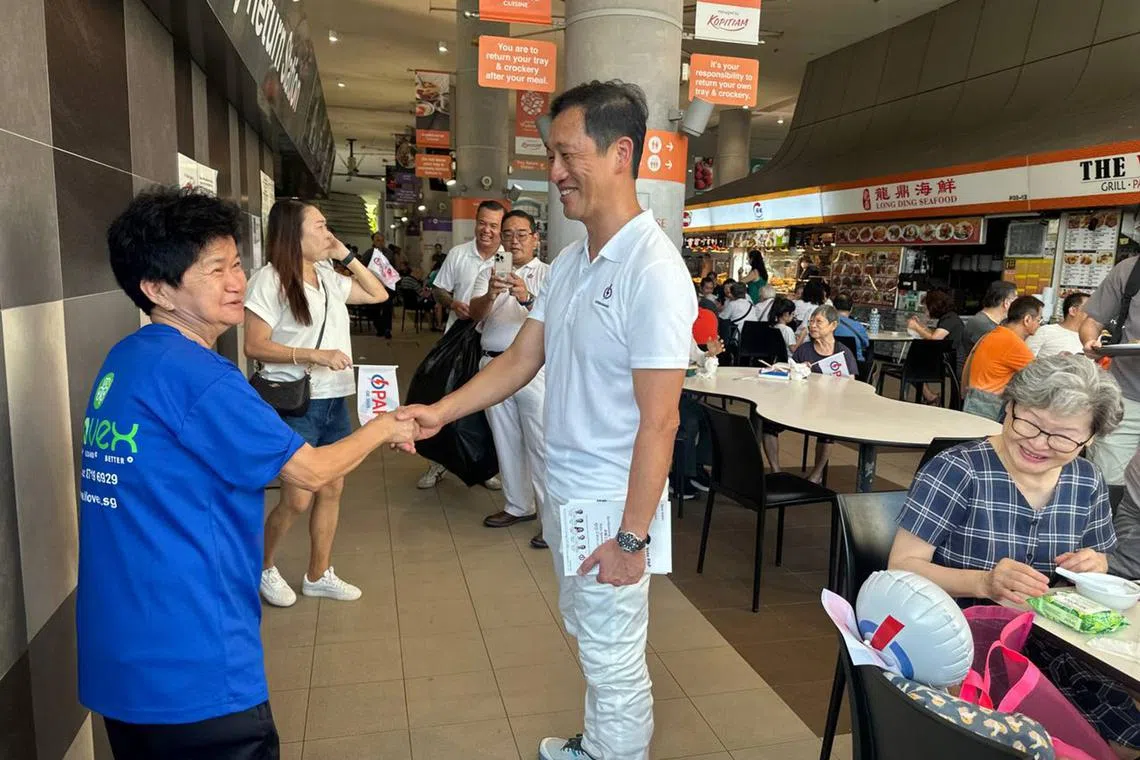GE2025: Ong Ye Kung challenges opposition to offer not just buzzwords, but specifics of policy proposals
Sign up now: Get ST's newsletters delivered to your inbox

Health Minister Ong Ye Kung greeting a resident during a walkabout at Kampung Admiralty Hawker Centre on April 27.
ST PHOTO: ZAIHAN MOHAMED YUSOF
Follow our live coverage here.
SINGAPORE – Opposition parties should go beyond generalities and buzzwords in their policy ideas, as policies are the basis by which Singaporeans will decide how they vote, said Health Minister Ong Ye Kung.
Speaking to reporters at a walkabout in Bukit Canberra Hawker Centre on April 26, Mr Ong said it was time to move past the excitement of Nomination Day to focus on the policy ideas of the different political parties.
“We have heard many things across different political parties, especially the opposition, as well as their policy ideas, but I would say we are now at the stage where the policy ideas are very general,” he said.
“It is probably a good time to start scrutinising some of these ideas.”
Mr Ong, who is leading the PAP’s Sembawang GRC team
Many, including the WP, PSP and SDP, have advocated against the increase in GST and called for essential items to be exempted from GST.
In its election manifesto,
However, Mr Ong said that the GST increase is needed purely to be able to subsidise healthcare for an ageing population. He noted that the Government’s healthcare expenditure was up to $9 billion in 2015, around $23 billion a decade later, and expected to reach $30 billion in 2030.
Even as they called for the GST to be cut, Mr Ong said the opposition has asked for government spending to rise in many other areas.
“Singaporeans and voters need to know: How do you bridge this gap (when) you are spending more and collecting less?” he said. “And I think the question will be: Are you thinking of spending the reserves?”
Parties should explain if they plan to do so, he added.
Public housing policy is another popular topic for the opposition, said Mr Ong, who added that among the ideas thrown up is for land cost to be removed or reduced in the pricing of Build-To-Order (BTO) flats, to make these cheaper.
The PSP and SDP are among the opposition parties that have made such proposals.
Referring to these proposals, Mr Ong said the question remains on whether these flats can then be resold on the resale market after reaching their minimum occupation period.
If they can be resold, the resale price will still be the same given that the resale market will not change, which means that the gains from selling will be much more, he noted.
“It will really be like striking a big lottery. That must surely attract a lot more people to apply for BTO flats and really (increase) the queue and wait times for flats,” he added.
The SDP has also suggested a non-open market scheme, where flats will not have a land cost component but can be resold only to the Housing Board at a lower price than what they were bought for.
Mr Ong said such a proposal would be a fundamental change to Singapore’s home ownership system.
“Only people who breach HDB rules, or defaulters of mortgages, will sell back to HDB at a lower price. Are they therefore really suggesting to treat everybody like HDB defaulters, making this a mainstream system?”
On foreign talent, Mr Ong said the Government has been balancing trade-offs, such as regulating their entry to the extent that businesses often struggle to fill vacancies, particularly for blue-collar jobs.
Yet, opposition parties have called for further restrictions, he noted.
For instance, the SDP has suggested vetting foreign professionals’ credentials and skills before they may work in Singapore. Opposition parties are also among those that have proposed that firms seeking to hire foreigners must first show that they cannot find such talent locally.
The PSP has in turn proposed lengthening the duration in which employers must advertise jobs on the MyCareersFuture portal before they can apply for Employment Passes to hire foreign talent.
Mr Ong said businesses will find it even more difficult if such proposals were implemented.
He said: “Some may have to close down. Foreign investment may slow down, which means we cannot create as many jobs as possible as we formerly could for Singaporeans.”
As for healthcare, the Health Minister noted that opposition parties like the SDP have proposed a “single-payer system”, but that most Singaporeans do not know what this means.
Mr Ong explained that a hospital bill is currently paid in three ways.
First, the Government will pay a subsidy. Second, MediShield Life, which is the national health insurance scheme, kicks in and pays for the next part of the bill, and the remainder is paid for by MediSave.
A single-payer system “basically means either you use only subsidy and abolish MediShield Life, or you purely rely on national health insurance and no more subsidy”, he said.
The SDP, for instance, has proposed a health insurance system without multiple schemes like MediShield Life or CareShield Life, channelling the savings straight to supporting primary care.
The Health Minister said: “When the opposition proposed a single-payer system, they needed to explain to Singaporeans what it means and which part you want to get rid of – the subsidy or MediShield Life?”
He noted that these four topics – cost of living, foreign talent, housing and healthcare – have been the key ones that he had been hearing about in the last few days.
“It is time, I think, for Singaporeans and voters to scrutinise these policies and compare the policies across political parties,” he said.



